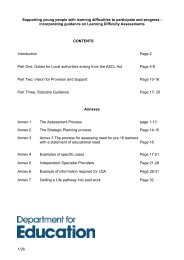What is the research evidence on writing? - Department for Education
What is the research evidence on writing? - Department for Education
What is the research evidence on writing? - Department for Education
You also want an ePaper? Increase the reach of your titles
YUMPU automatically turns print PDFs into web optimized ePapers that Google loves.
- Ninety per cent of girls achieved level 5 or above to 79 per cent of boys.<br />
3.5 Key Stage 4<br />
Writing <str<strong>on</strong>g>is</str<strong>on</strong>g> not assessed separately at Key Stage 4 but it <str<strong>on</strong>g>is</str<strong>on</strong>g> part of <str<strong>on</strong>g>the</str<strong>on</strong>g> Engl<str<strong>on</strong>g>is</str<strong>on</strong>g>h<br />
assessment.<br />
At Key Stage 4, <str<strong>on</strong>g>the</str<strong>on</strong>g> latest data shows that in 2012 (DfE, 2012c):<br />
- 568,600 pupils attempted a GCSE in Engl<str<strong>on</strong>g>is</str<strong>on</strong>g>h, and 69 per cent of those<br />
achieved a grade A*-C.<br />
- The gender gap <str<strong>on</strong>g>is</str<strong>on</strong>g> still evident with 76 per cent of girls getting a grade A*-C<br />
compared to 62 per cent of boys.<br />
- Sixty eight per cent of pupils made <str<strong>on</strong>g>the</str<strong>on</strong>g> expected level of progress in Engl<str<strong>on</strong>g>is</str<strong>on</strong>g>h in<br />
2012 compared to 72 per cent in 2011.<br />
<str<strong>on</strong>g>What</str<strong>on</strong>g> <str<strong>on</strong>g>is</str<strong>on</strong>g> <str<strong>on</strong>g>the</str<strong>on</strong>g> role of coursework in gender differentiated achievement?<br />
There has been some d<str<strong>on</strong>g>is</str<strong>on</strong>g>cussi<strong>on</strong> in <str<strong>on</strong>g>the</str<strong>on</strong>g> <str<strong>on</strong>g>research</str<strong>on</strong>g> literature around <str<strong>on</strong>g>the</str<strong>on</strong>g> role of<br />
coursework in relati<strong>on</strong> to <str<strong>on</strong>g>the</str<strong>on</strong>g> gender gap.<br />
In 2012, <str<strong>on</strong>g>the</str<strong>on</strong>g>re was a 12 percentage points gap in <str<strong>on</strong>g>the</str<strong>on</strong>g> proporti<strong>on</strong> of girls and boys<br />
achieving <str<strong>on</strong>g>the</str<strong>on</strong>g> expected level of progress in Engl<str<strong>on</strong>g>is</str<strong>on</strong>g>h between Key Stage 2 and Key<br />
Stage 4. The equivalent figures <strong>for</strong> 2006 were 66 per cent <strong>for</strong> girls and 53 per cent <strong>for</strong><br />
boys, which suggest a big improvement in <str<strong>on</strong>g>the</str<strong>on</strong>g> proporti<strong>on</strong>s of pupils making <str<strong>on</strong>g>the</str<strong>on</strong>g><br />
expected progress and a reducti<strong>on</strong> in <str<strong>on</strong>g>the</str<strong>on</strong>g> gender gap (DfE, 2012c).<br />
Research suggests that girls outper<strong>for</strong>m boys in most types of coursework, and <str<strong>on</strong>g>the</str<strong>on</strong>g>y<br />
do relatively better <strong>on</strong> coursework than <strong>on</strong> examinati<strong>on</strong>s, but <strong>on</strong>ly marginally<br />
(Elwood, 1995). In additi<strong>on</strong>, coursework tends to have a higher influence over final<br />
grades <strong>for</strong> boys than <strong>for</strong> girls (Elwood, 1995; 1999). No <str<strong>on</strong>g>evidence</str<strong>on</strong>g> linking coursework<br />
in Engl<str<strong>on</strong>g>is</str<strong>on</strong>g>h and boys’ or girls’ achievement has been identified. Coursework in all<br />
GCSEs has been replaced by c<strong>on</strong>trolled assessment in <str<strong>on</strong>g>the</str<strong>on</strong>g> last years.<br />
3.6 Internati<strong>on</strong>al <str<strong>on</strong>g>evidence</str<strong>on</strong>g><br />
The Nati<strong>on</strong>al Assessment of Educati<strong>on</strong>al Progress (NAEP) study in United States <str<strong>on</strong>g>is</str<strong>on</strong>g><br />
carried out every five years and in 2011 assessed, am<strong>on</strong>g o<str<strong>on</strong>g>the</str<strong>on</strong>g>r things, <str<strong>on</strong>g>the</str<strong>on</strong>g> <strong>writing</strong><br />
skills of 8 th and 12 th grade students in a computer-based assessment. It found that<br />
(NCES, 2012):<br />
- In 2011, about <strong>on</strong>e quarter of students at both grades 8 th and 12 th per<strong>for</strong>med<br />
at <str<strong>on</strong>g>the</str<strong>on</strong>g> ‘proficient’ level, dem<strong>on</strong>strating <str<strong>on</strong>g>the</str<strong>on</strong>g> ability to communicate well in<br />
<strong>writing</strong>.<br />
- Fifty-four per cent of students at 8 th grade, and 52 per cent of students at<br />
12 th grade per<strong>for</strong>med at <str<strong>on</strong>g>the</str<strong>on</strong>g> ‘basic’ level in <strong>writing</strong>.<br />
- Three per cent of students at 8 th grade and 3 per cent of students at 12 th<br />
grade per<strong>for</strong>med at <str<strong>on</strong>g>the</str<strong>on</strong>g> ‘advanced’ level.<br />
- There were differences in students’ per<strong>for</strong>mance by race/ethnicity, gender<br />
and school locati<strong>on</strong>.<br />
10
















